| Shaping the future health of babies |
| To ensure future mailings from SMA® Professional reach your mailbox, add smaprofessional@smaprofessional.msgfocus.com to your safe sender list. |
| Email not displaying properly? Click here to view in browser |
 |
| |
| |
Dear Healthcare Professional,
Welcome to the January edition of our eNewsletter, aimed to keep you updated with the latest news in the field of infant nutrition.
Happy 2018! To kick off this year we are talking about the very common problem of feeding issues in infants and some of the guidance that is available to support you in your roles. Please also see below for some important information about SMA® LF Lactose Free.
Kind regards,
The SMA® Professional Team |
| |
 |
| |
|
|
 Do you frequently see infants with a feeding issue? Do you frequently see infants with a feeding issue? |
| |
| As well as FGIDs, feeding issues also encompass lactose intolerance and CMPA, both of which have a defined organic cause. Infant feeding issues are very common, especially during the first few months of life.1 Symptoms cause parental anxiety, driving parents to seek advice from primary care healthcare professionals. |
| |
 |
| |
FGID: Functional Gastrointestinal Disorder
CMPA: Cows' Milk Protein Allergy |
| |
 |
| |
 |
| |
In the majority of infants, the most appropriate management of uncomplicated functional gastrointestinal disorders should focus on:- A review of feeding practices
- Parental reassurance
- Where necessary, offering infants adequate nutritional support4,5
There are NICE guidelines to support the appropriate management of reflux, infantile colic and constipation,6-8 as well as MAP guidelines on the management of CMPA.9 These are key to reducing the impact on infant and family and the burden on the healthcare services.10 |
| |
NICE: National Institute for Health and Care Excellence
MAP: Milk Allergy in Primary Care
CMPA: Cows' Milk Protein Allergy |
| |
 |
| |
 |
| |
 Introducing SMA® Nutrition's Specialist formula range Introducing SMA® Nutrition's Specialist formula range |
| |
| The broadest, most comprehensive range available.
|
| |
 |
Individually tailored to meet the challenges of specific feeding issues |
| |
 |
Based on latest advances in scientific and clinical research |
| |
 |
Wide availability in retail or to be ordered via pharmacy* |
| |
| * SMA® PRO High Energy is available in pharmacies only. |
| |
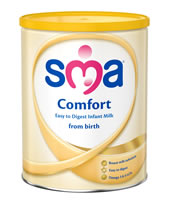 |
| Mild digestive discomfort |
| |
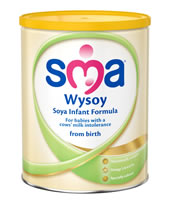 |
| Cow's milk intolerance |
| |
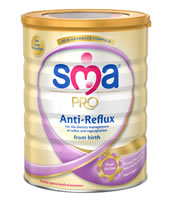 |
| Reflux and regurgitation |
| |
|
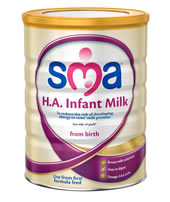 |
| Family history of allergy |
| |
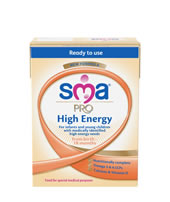 |
| Faltering growth |
| |
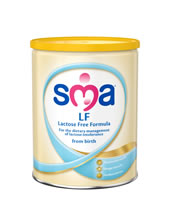 |
| Lactose intolerance |
| |
|
SMA Lactose Free availability
Unfortunately due to circumstances beyond our control, we will be out of stock of SMA® LF Lactose Free 430g tin for approximately 2 weeks starting mid-January. We hope to have full availability again by the first week of February.
For any further advice on our products, please contact our Careline on UK 0800 081 8180 or
ROI 1800 931 832, via live chat (9am to 5pm) or via e-mail on UK https://www.smababy.co.uk/sma-careline/
|
| |
|
|
 |
| |
® Registered Trademark.
IMPORTANT NOTICE: The World Health Organisation (WHO) has recommended that pregnant women and new mothers be informed on the benefits and superiority of breastfeeding – in particular the fact that it provides the best nutrition and protection from illness for babies. Mothers should be given guidance on the preparation for, and maintenance of, lactation, with special emphasis on the importance of a well-balanced diet both during pregnancy and after delivery. Unnecessary introduction of partial bottle-feeding or other foods and drinks should be discouraged since it will have a negative effect on breastfeeding. Similarly, mothers should be warned of the difficulty of reversing a decision not to breast-feed. Before advising a mother to use an infant formula, she should be advised of the social and financial implications of her decision: for example, if a baby is exclusively bottle-fed, more than one can (400 g) per week will be needed, so the family circumstances and costs should be kept in mind. Mothers should be reminded that breast milk is not only the best, but also the most economical food for babies. If a decision to use an infant formula is taken, it is important to give instructions on correct preparation methods, emphasising that unboiled water, unsterilised bottles or incorrect dilution can all lead to illness. • SMA® Wysoy® milk-free formula is intended to meet the nutritional needs of babies and children who are intolerant to cows’ milk protein, lactose or sucrose. Soya infant formulae are not recommended for preterm babies or those with kidney problems, where medical guidance should always be sought. • The following products must be used under medical supervision. • SMA® PRO Anti-Reflux is a special formula intended for the dietary management of bottle-fed babies when significant reflux (regurgitation) is a problem. It is suitable as the sole source of nutrition up to 6 months of age, and in conjunction with solid food up to 12 months of age. If the baby’s reflux does not improve within 2 weeks of starting SMA PRO Anti-Reflux, or if the baby fails to thrive, the family doctor should be consulted. • SMA LF® is a lactose-free milk based formula for the dietary management of babies and young children who are intolerant to lactose or sucrose, or who are experiencing symptoms such as diarrhoea, tummy ache or wind caused by temporary lactose intolerance. It is suitable as the sole source of nutrition up to 6 months of age, and in conjunction with solid food up to 18 months of age. SMA LF is not suitable for those who are allergic to cows’ milk protein, or who suffer from galactosaemia or require a galactose free diet. • SMA® PRO High Energy is a milk based formula for the dietary management of babies and young children with medically determined high energy requirements as identified by a healthcare professional. It is suitable as the sole source of nutrition up to 6 months of age, and in conjunction with solid food up to 18 months of age. SMA® PRO High Energy is not intended for use with preterm babies, for whom fortified breast milk or a low birthweight formula such as SMA® PRO Gold Prem 1 is more appropriate.
References: 1. Iacono G et al. Digestive and Liver Disease 2005; 37(6): 432–438. 2. Heyman M. Pediatrics 2006; 118 (3); 1279–1286. 3. Vandenplas Y et al. JPGN 2015 (61); 5: 531–537. 4. Vandenplas Y et al. Nutrition 2013; 29: 184–194. 7. 5. Vandenplas Y et al. Gut health in early life: Implications and Management of Gastrointestinal disorders. Essential knowledge briefings. Wiley. Chichester. 2015. 6. NICE. Gastro-oesophageal reflux disease in children and young people: diagnosis and management. 2015. Available here. Accessed July 2017. 7. NICE. Constipation in children and young people: diagnosis and management 2010. Available here. Accessed July 2017. 8. NICE. Clinical Knowledge Summaries: Colic-infantile. Available here. Accessed July 2017. 9. Venter C et al. Clin Transl Allergy 2013; 3(1): 23. Available here. Accessed July 2017. 10. Sladkevicius E et al. J Med Econ 2010; 13(1): 119–128. |
| |
 |
| |
|
|
To ensure future mailings from SMA® Professional reach your mailbox, add smaprofessional@smaprofessional.msgfocus.com to your safe sender list.
Contact SMA® Nutrition | Terms & conditions
This email is intended for residents of the UK
Unsubscribe |
| |
| ZTC2051/01/18 |
|
|
|
|
|